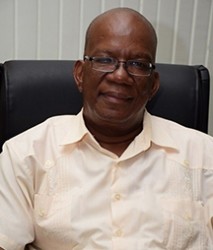The new government is looking to increase public servants’ salaries by 10% in keeping with the APNU+AFC promise in its elections manifesto, ac-cording to newly-appointed Finance Minister Winston Jordan, who says the administration also has to work on tempering expectations.
Jordan, who took the oath of office on Wednesday, said while it sounds good to have a 10% payout, it makes no sense if you have to spend more and “end up in a deeper hole.”
The coalition recently clinched the presidency from the PPP/C, which had been in power for almost 23 years, and during its campaign it promised a “significant” increase in the salaries of government workers within the first 100 days of taking office.

While no indication was given as to what the “significant” increase would be, Jordan told Stabroek News during an interview yesterday that the magic figure is 10%.
Although the figure is not definitive, he said he is working with his staff to come up with scenarios and costs for the achievement of the coalition’s 100-day plan. He said once this information has been compiled, it will be taken to the Cabinet.
According to Jordan, people have the notion that whenever there is talk of an increase, “you have to find the money from doing something that will cost an increase in maybe inflation but no, it doesn’t have to be that all the way. There is a concept called reallocation of resources.”
He said he has already spoken to the Guyana Revenue Authority head Khurshid Sattaur about the Value-Added Tax (VAT). A reduction of VAT is also on the list of promises made by the coalition.
Jordan said while the VAT collections have been “reasonably good,” what has been noticed is that there is a trend of VAT increasing at a declining rate. “He (Sattaur) accepted that there are some challenges and I asked him what does he require so that we could remove those challenges,” Jordan said, while adding that he emphasised that ways have to be found to deal with the situation and cut out the “weight or the fat as we call it.”
Making it crystal clear that he envisions a Finance Ministry known for transparency and accountability, he also said that he is aware that expectations are running high. He assured, though, that in time people will be better off.
Jordan said he and the new government are working to ensure that people are better off, that poverty is reduced and that the economy can grow. The economist and former head of the budget office of the Ministry of Finance noted that the country cannot continue to grow at rates of 4% and 3%. He added that an increase in high rise buildings is not a sign of growth, rather an improvement in people’s lives is.
According to Jordan, promises made by the coalition are not “an idle boast… they are, in many cases, within the realm of possibility, of happening. I dare say, at least the point as it relates to the salary increase, the pension increase, the review of the VAT… I dare say those are promises that can be kept.”
With respect to the reduction in VAT and the Berbice Bridge toll, Jordan could not say when these announcements will be made public and pointed out that the timing would depend largely on the budget.
Budget
Asked about the presentation of the budget, he said it is constitutionally due three months after the Parliament is first convened after an elections. He said that Parliament has to be convened by June 10th, one month after the elections were called. According to him, his ministry will then have up to the end of August to finalise and produce the budget. “Hopefully we bring it earlier than that. I would like that. The preparation of the 2016 budget have to start almost immediately with the preparation of the 2015 budget because of the lateness of the 2015 budget being prepared,” he further said.
Stabroek News specifically asked about the involvement of the PPP/C and civil society in the budget planning process and in response Jordan said that there is a part of the budget preparation that calls for consultation. He did not reveal whether the opposition has signaled its willingness to contribute to the process or whether any member of civil society has approached or has been approached in this regard. He also expects this year’s budget to have a deficit as is the case every year.
He added that the Ministry will be part of a multi-agency approach in tackling job creation. He said that it will be looking at small-enterprise development and particularly from the ministry’s perspective bringing contractors “back into the fold… give them opportunities to bid.” He also spoke of the inclusion of “community people” in contracts. He said the ministry does have a number of ideas, some of which have already been mentioned by President David Granger.
Asked about the unemployment rate, he said that the current level is “everybody’s guess.” He noted that no work in this area has been done of recent but mentioned that he has recently spoken to the Chief Statistician with respect to producing quarterly releases of statistics and conducting surveys. He said that “we will be moving from the talking stage to getting an action plan as to what is required to rebuild the Statistical Bureau so that it serves the purposes for which it was established. Over the years, the Bureau has been severely emasculated and severely hampered… we required a strong Statistical Bureau producing timely and accurate information.”
Investment
Asked about the country’s foreign reserves, Jordan also revealed that a week ago he received information that the country’s reserves were in the region of US$610M. He said he is trying to determine how the reserves fell from almost US$900M, which was the figure about a year ago, to what it is today. He said that this difference is a bit of a concern and he plans to put steps in place to ensure that this is not a permanent situation. He said lower gold and sugar earnings are some of the factors that may have caused the “slide… I am looking more closely at it to definitely put together some of the reasons and to assert whether this may be a continuation and what measures could be put in place to stem any further decline in the reserves.”
Asked about plans to boost investment, he said that government will play a role in creating a facilitating environment and will also be revamping Go-Invest. He noted that Granger had said that one of the plans for the Foreign Ministry is economic diplomacy. “Already we are signaling that investment, foreign and local, is the engine of our long term goal,” he said, while pointing out that the new Minister of Foreign Affairs Carl Greenidge has a strong economic background as well as experience in foreign affairs. This wealth of skills, he pointed out, is needed for implementation of such a programme.
Coming on stream later this year, he also noted, would be at least one large foreign gold mining operation which would increase output. “Output doesn’t not necessarily mean that income will be increased,” he, however, said, while explaining that this will contribute to growth. He explained that a significant part of this income will be exported as the industries are foreign-owned. Jordan said though that the country will reap the revenues of the taxes paid and will benefit from employment and modern technology.
He signaled that the new government has taken note that foreign-owned companies have not fulfilled their investment agreements. These occurrences will be investigated, he said. Chinese company Baishanlin and Indian company Vaitarna among others have been cited in this regard.
Jordan also said that from a financial perspective, the failing sugar industry is a cause for concern. “Sugar has been a major plank in our country for centuries…. it is in difficult times just like bauxite at one time but we have to find creative ways to deal with sugar in a definite manner,” he noted. Jordan added that first an assessment needs to be done so as to identify those “creative ways.” He stressed that one has to look for a programme “which will bring a definite turnaround and how the government in terms of its resources will help to bring about that turnaround.”








